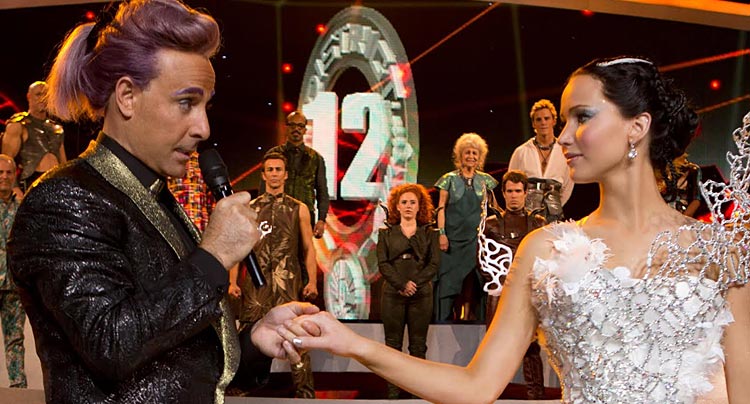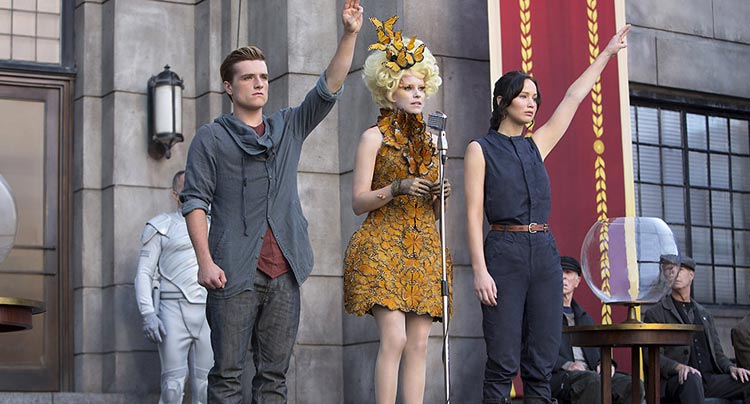
A high-quality science fiction series for a new generation, and it's one they can be proud of.

A high-quality science fiction series for a new generation, and it's one they can be proud of.
Much like its successful predecessor, The Hunger Games: Catching Fire–directed by Francis Lawrence (I Am Legend) and based on the book series by Suzanne Collins–features rock-solid performances, great writing, and inventive action set pieces set in a sci-fi dystopia. The Hunger Games was a largely enjoyable and entertaining blockbuster romp, but its sequel betters it in every respect, a tightly-woven, thrilling, adrenaline-pumped beast of a film with a 146-minute running time that feels like 60. Like a bulldozer, the film plows forward, never stopping, sweeping you up in its sci-fi action clutches and never letting go.
As the film begins, we find our teen heroine Katniss Everdeen (Jennifer Lawrence, the backbone of the film) in a traumatized state after “winning” the last Hunger Games–a Battle Royale-style arena challenge used as a tool of oppression by a totalitarian government called “The Capitol”–for the people of District 12, the place she calls home. She and her friend Peeta (Josh Hutcherson), who represented District 12 with her in the games, found a way for them to both survive the contest, outsmarting the Capitol and irritating President Snow (Donald Sutherland) in the process. The bow-wielding huntress’ cunning defiance has made her something of a symbol of hope for the destitute, violently oppressed districts of Panem. In retaliation, the malevolent Snow has finagled the next games so that Katniss and Peeta are thrown in again, along with other winning tributes from previous games.
As Katniss and Peeta are sent on a Capitol-mandated “victory tour”, paraded around in front of the districts whose tributes they’ve killed in the games, they wrestle with overwhelming PTSD and winners’ guilt (they’re plagued with constant night terrors and visions of death), though they’re forced to feign happiness (and love for each other) when in public. Katniss is reluctant in her new role as revolutionary, to say the least. Disgusted is a better word. Though she’s ignited a spark of revolution in Panem, all she really wants is to keep her loved ones safe and lead a normal life–a fool’s dream at this point, tragically.
The tension is thick and the stakes are sky-high from the opening moments of the film, and the intensity never ever lets up. This is mostly thanks to Lawrence, who sells the gravity and magnitude of the drama every second she’s on screen. With the Capitol bearing down on her and the rebellion holding her up her up, she’s being crushed in the middle, and the anguish is written all over her face.

In a terrific scene, Katniss stands in front of a district whose deceased tribute was one of her allies in the games. She sees the family of the tribute, and guilt, sorrow, fury, and regret slowly crush the pretty princess charade forced onto her by the Capitol. She gives an impassioned, mournful eulogy of her fallen friend, and inadvertently inspires the downtrodden citizens to show transgressive signs of revolt against the Capitol guards, who respond with lethality. Katniss is dragged away, heart shattered by the consequences of her accidental incitation, and we see her soul break in front of our eyes. The grand, sweeping themes of gender expectations, mental oppression, feminism, and violence as entertainment are siphoned through a relatable, layered, human character in Katniss, and Lawrence gets the message across superbly.
The supporting cast rises to the occasion, too. Phillip Seymour Hoffman, a new, fantastic addition to the cast (no surprise there), plays the new “game designer” (a sadistic position, in the context of these “games”.) Stanley Tucci returns as the absurdly jubilant Hunger Games host, and matching his pizazz is the also returning Elizabeth Banks as the gaudily attired Effie Trinket, Katniss and Peeta’s den mother, of sorts. Jena Malone is a standout as Johanna, an axe-wielding, F-bomb-dropping punk queen who spits in the face of the Capitol.
The love triangle between Katniss, Peeta, and hunky huntsman Gale (Liam Hemsworth) is downplayed here, as are the games themselves. It’s appropriate, since the real story here is one of people vs government. Fear not; nearly half of the film is spent with Katniss fighting for her life in the games, but the light of the rebellion and shadow of the Capitol pervades it all. Like the first film, the actions scenes are slick and imaginative, and Lawrence sells the games’ danger just as well as she does the dramatic beats. Francis Lawrence has a good eye for action, and infuses the action set pieces with so much suspense and terror it can feel like a horror movie at times. The set and costume design are also excellent, and Lawrence’s lush visual style magnifies their craftsmanship.
The one major weakness of the film is an unavoidable one: the ending is such a cliffhanger (it follows the book to a T) that it makes the film feel more like an episode than a complete, contained story. It’s noticeably manipulative, but for the life of me I can’t begin to think of an alternative narrative route. This is a series, after all.
Despite sharing a similar narrative structure with the first film, Catching Fire ups the ante and heightens every element of the storytelling, from the drama to the stakes to the performances to the action. All of the elements of the film work so well in concert that it’ll capture your attention entirely, and you’ll forget that it’s a tentpole studio film meant to sell merchandise. It transcends the category of “young adult cash-grab” many are so quick to shove it into, next the Twilights of the world. It’s so much better than that; this is a high-quality science fiction series for a new generation, and it’s one they can be proud of.